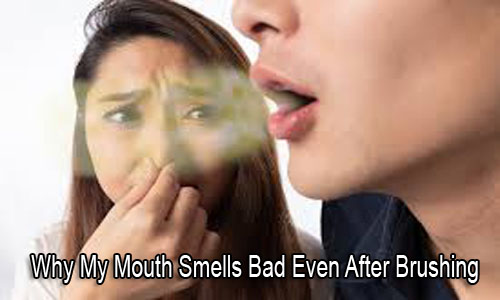Why Mouth Smells Bad Even After Brushing?

You brush your teeth twice a day, maybe even floss regularly, yet that unpleasant odor just won’t go away. Sound familiar? Bad breath, or halitosis, despite good oral hygiene, is more common than you might think. It’s not just embarrassing—it can be a sign of deeper health or lifestyle issues.
In this detailed guide, we’ll explore the real reasons your Mouth Smells Bad even after brushing, backed by science and expert recommendations. Plus, we’ll point you to a comprehensive oral health solution that could transform your oral health.
1. Residual Bacteria in Hard-to-Reach Places
Even after brushing, bacteria can thrive:
- On the tongue: It’s a bacterial hotspot. If you’re not brushing or scraping it, you’re missing a major cause of odor.
- Between the teeth and below the gumline: Regular toothbrushes often can’t reach these tight areas.
Solution: Use an antibacterial mouthwash and consider adding interdental brushes or a water flosser to your routine.
2. Dry Mouth (Xerostomia)
Saliva is essential for flushing away food particles and bacteria. When your mouth is dry:
- Bacteria multiply rapidly
- Odors become more concentrated
Common causes:
- Medications (antihistamines, antidepressants)
- Mouth breathing (especially during sleep)
- Dehydration or alcohol-based mouthwashes
Solution:
- Stay well-hydrated
- Use alcohol-free mouth rinses
- Consider natural oral probiotics to restore healthy flora balance
3. Coated or Unclean Tongue
A white or yellowish coating on the tongue is often a biofilm of bacteria and dead cells—a major contributor to foul breath.
Solution: Use a tongue scraper daily. Some electric toothbrushes come with a tongue-cleaning feature.
4. Gut Health and Digestion Issues
Sometimes the problem isn’t just in the mouth. Poor gut health can lead to smelly breath due to:
- Imbalances in gut bacteria (dysbiosis)
- Acid reflux
- Constipation
Solution:
- Eat a diet high in fiber
- Consider adding probiotic-rich foods
- Evaluate your gut health with a healthcare provider
5. Diet and Lifestyle Habits
Certain foods and habits can cause lingering bad breath, even after brushing:
- High-protein, low-carb diets
- Dairy products
- Onions and garlic
- Smoking and vaping
These foods or substances can create volatile sulfur compounds (VSCs), responsible for that unmistakable “rotten egg” smell.
Solution: Limit these triggers and support your oral microbiome with natural supplements that contain targeted probiotics.
6. Gum Disease (Gingivitis or Periodontitis)
Bad breath is a classic symptom of early gum disease. When plaque builds up below the gum line, it causes:
- Bleeding, swelling, or redness
- Deep pockets where bacteria thrive
- A persistent foul odor
Even brushing won’t remove this buildup if it’s already progressed.
Solution:
- Visit a dentist for a periodontal cleaning
- Use advanced oral probiotics and supplements to maintain a healthy balance of bacteria
7. Tonsil Stones
Tonsil stones are small, smelly clusters of debris that get trapped in the tonsils. They often:
- Smell foul due to sulfur compounds
- Aren’t removed by brushing or flossing
Solution: Gargle regularly with warm saltwater or a specialized mouthwash, and consult a dentist if they’re frequent.
8. Hidden Infections or Medical Conditions
Chronic sinus infections, diabetes, liver disease, or kidney issues can also cause persistent bad breath.
If nothing else works, consult a healthcare provider for a deeper evaluation.
So What’s the Solution?
While changing your brushing routine helps, what you really need is a comprehensive oral health support system that goes beyond toothpaste.
✅ Discover Our In-Depth Review of ProDentim →
In this exclusive review, you’ll learn how a unique oral probiotic blend has helped thousands restore fresh breath, reduce plaque, and even improve gum health—naturally.
We also explore:
- The scientific backing behind it
- Its natural ingredients
- Why it’s safe, gentle, and effective
- What bonuses come with it (including a personalized oral guide)
Final Thoughts
Bad breath after brushing is not something you have to live with. Once you understand the root causes—from dry mouth and bacteria to diet and digestion—you can take powerful, evidence-based steps to fix it.
And if you want to go further in supporting your oral health naturally, be sure to check out the ProDentim review linked above. It might be the missing piece in your journey to a truly fresh, confident smile.
I hope you found this article helpful and informative, so you now can know Why My Mouth Smells Bad Even After Brushing? and how to fix it.
If you have questions or need help, don’t hesitate to leave a comment below, and we will be more than happy to answer it as soon as possible.